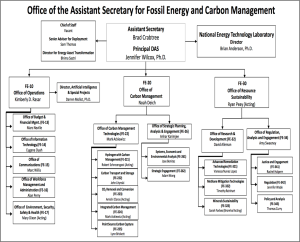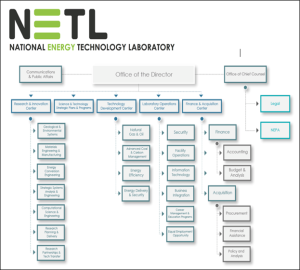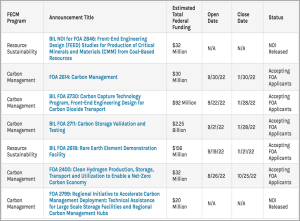CLEAN COAL PROGRAMS
Which U.S. Department of Energy offices are responsible for clean coal?
Within the U.S. Department of Energy, the Office of Fossil Energy and Carbon Management (FECM) is tasked with minimizing the environmental impacts of fossil fuels while working towards net-zero emissions. And DOE’s National Energy Technology Laboratory (NETL), as the nation’s premier energy technology lab, is also tasked with supporting DOE’s clean coal efforts, as part of its mission to deliver solutions that enable a sustainable energy future. [1] The research done by NETL scientists and engineers provides the scientific basis for clean coal technology processes. [2]

Source: U.S. Department of Energy [3] As of September 1, 2022
NETL’s Technology Development Center implements national programs in fossil energy and carbon management, including Advanced Coal and Carbon Management. [4]

Source: U.S. Department of Energy [5]
Are there current U.S. R&D Programs related to clean coal?
FECM CLEAN COAL PROGRAMS
FECM programs use research, development, demonstration, and deployment efforts to advance technologies to meet the Nation’s climate and environmental goals. The following FECM programs are advancing various clean coal technologies and processes:
The Point Source Capture (PSC) Research and Development program applies lessons learned from large demonstration projects on coal-fired power generation and industrial emission sources like steel and cement production. The program aims to accelerate the deployment of carbon capture technologies for natural gas and industrial sources over the next decade, with the goal of creating highly efficient, transformational PSC technologies that can achieve greater than 95% carbon capture. [6]
Hydrogen with Carbon Management
Currently, the most economical ways to generate clean hydrogen is through the use of fossil sources and sustainable biomass, combined with CCUS. The Hydrogen with Carbon Management Program invests in research, development, and demonstration (RD&D) to gage whether carbon-based hydrogen as a fuel is a cost-competitive alternative to traditional fossil fuels. The program focuses on developing next generation carbon neutral or net negative GHG emissions technologies, such as the gasification of wastes, reversible solid oxide fuel cells, hydrogen turbine technology, advanced materials, and sensors and controls. This program is part of DOE’s Hydrogen Energy Earthshots Initiative, which has a goal of achieving clean hydrogen costs of $1 per kilogram within one decade. [7]
To help build a carbon transport and storage industry at the scale necessary to decarbonize the U.S. economy, the Carbon Transport and Storage Program is making key investments in advanced technology RD&D, large-scale transport scenarios, commercial-scale storage facilities, and regional hubs. Efforts focus on strategies to improve performance and reduce the cost of reliable carbon storage, creating educational partnerships for growing the workforce, and technology transfer and technical assistance to stakeholders. [8]
Critical Mineral Sustainability
The billions of tons of coal waste and ash, acid mine drainage, and discharged water as a result of mining across the U.S. contain a wide variety of valuable rare earth elements and other critical minerals that are key to manufacturing clean energy technologies, such as solar panels, wind turbines, electric vehicles, and hydrogen fuel cells. [9]
The Minerals Sustainability Division is focused on creating an environmentally, economically, and geopolitically sustainable supply chain of critical minerals while bolstering the Nation’s transition to a clean energy economy. [10] To accomplish this, the program’s RDD&D efforts advance environmentally benign and cost efficient extraction, purification, reduction, refining, and alloying processes and technologies that produce high-purity critical minerals, including rare earth metals, and facilitate manufacturing of high value carbon products. [11]
The Carbon Conversion (CC) Program is focused on technologies that recycle CO2 into value-added products on an economic scale. The program focuses on several pathways, including mineralization, catalytic conversion, and biological approaches to create CO2-based building materials, fuels, and chemicals. [12]
FECM CLEAN COAL FUNDING OPPORTUNITIES
In October 2022, FECM issued a Notice of Intent to fund a $32 million Bipartisan Infrastructure Law program supporting front-end engineering design studies to produce rare earth elements and other critical minerals and materials from domestic coal-based resources. [13] Learn more.
The table below shows other recent examples of FECM funding opportunities.

Source: U.S. DOE Office of Fossil Energy and Carbon Management [14]
NETL CLEAN COAL PROGRAMS
NETL manages two carbon capture programs as part of DOE’s Clean Coal and Carbon Management Program.
This NETL program is focused on advancing post-combustion capture and pre-combustion capture technologies to provide step-change reductions in both cost and energy penalties compared to currently available technologies. Within this program, the National Carbon Capture Center (NCCC) has facilitated maturation of technologies from laboratory- to bench- to pilot- scale testing on actual flue gas or syngas. [15]
Point Source Carbon Capture Program
NETL’s Point Source Carbon Capture Program is advancing technologies for the capture of CO2 from point sources, such as power generation plants and industrial facilities that burn coal. R&D efforts are focused on reducing operating costs through the development of new process efficiencies or advanced CO2 capture media, such as solvents, sorbents, and membranes. Of interest are highly efficient, scalable carbon capture technologies that can achieve greater than 95% carbon capture. [16]
UNIVERSITY-BASED CLEAN COAL PROGRAMS
University Coal Research (UCR) Program
The UCR program focuses R&D efforts that are designed to address FECM strategic goals in concert with student education relevant to carbon management areas. Some of the research areas supported include near-zero-emission power plants, carbon capture, computational energy sciences, development of advanced high-performance materials, sensors and controls, and the development of hybrid power generation systems. [17]
In an August 2022 funding initiative, as part of FECM/NETL’s University Training and Research (UTR) program, DOE funded 18 early stage decarbonization research projects through the UCR program and the Historically Black Colleges and Universities and Other Minority Institutions (HBCU-OMI) program (one objective of the HBCU–OMI program is to provide R&D opportunities for traditionally underrepresented populations in STEM fields [18]). These projects will explore blending biomass feedstocks with waste coal, coupled with CCS, and also reclamation and remediation of legacy environmental impacts of coal-based production and generation. NETL will manage the projects. See all 18 projects. [19] Learn more about UTR.
Updated November 2022, Tina Allen

Comments are closed.